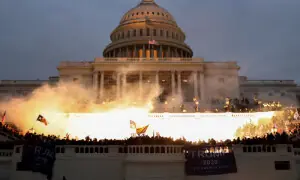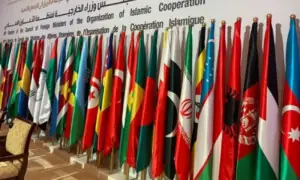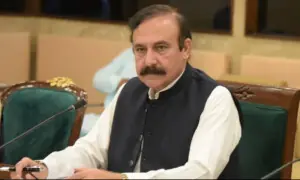Meddling case: SC wonders judiciary’s response as institution on judges letter
5 min readThe Supreme Court has issued the written order of the first hearing of the suo motu proceedings of the meddling case and wondered about the judiciary’s response as an institution to the allegations levelled by the high court judges against intelligence agencies in a letter to the Supreme Judicial Council.
On page five of the 16-page order, it is mentioned that six out of the eight judges of the Islamabad High Court have mainly requested to undertake “intuitional consultation” against the background of the issues raised by them “to consider how best to protect independence of the judiciary”.
They have also called for putting in place a mechanism to affix liability for those who “undermine such independence” and clarity for the benefit of individual judges the course they must take when they find themselves at the receiving end of interference and/or intimidation by members of the executive.
“We are, therefore, of the view that it would be an appropriate starting point, in the present proceedings, to call for proposals from the main stakeholders in the judicial system and the independence of the judiciary,” the order said.
They are the Pakistan Bar Council, the Supreme Court Bar Association, the high courts, and the federal government.
Proposals would be sought from them “as to what should be the institutional response and mechanism to address the issues like the ones raised in the letter and ensure that such issues do not arise in future and if they do, to fix liability and proceed against those responsible.”
The idea behind such a process was to empower the high courts and their respective chief justices to deal with issues relating to high courts judges or the district judiciary. The SC expected that the proposals shall be made after proper consultation within the respective bodies and be filed by April 25, 2024.
The SCBA and the PBC should be arrayed as parties to assist the court, it said and added that notices shall be served to the two bodies and the attorney general for Pakistan for the federal government as the matter involves questions as to the interpretation of constitutional law .
The apex court reminded senior counsel Hamid Khan and Khawaja Ahmed Hosain that the matter was governed by the Supreme Court (Practice and Procedure) Act, 2023 and was required to be first placed for consideration before the committee constituted there under, and once the committee approves their cases and any other such cases which may be fixed together with this matter.
The order was issued six days after the hearing on April 3. It was also the first time that Chief Justice of Pakistan Qazi Faez Isa did not dictate the order in the court, according to court reporter Hasnaat Malik.
CJP Isa said that “any attack” on the judiciary’s independence would not be tolerated as he hinted at forming a full court to hear a suo motu case.
A seven-member bench — comprising CJP Isa and justices Syed Mansoor Ali Shah, Yahya Afridi, Jamal Khan Mandokhail, Athar Minallah, Musarrat Hilali and Naeem Akhtar Afghan — presided over the hearing. It was streamed live on the SC’s website and its YouTube channel.
Justice Yahya Afridi recuses from bench
Justice Yahya Afridi, a member of the bench, recuse himself from the bench hearing the present suo motu proceedings.
“None can dispute that the anxiety of the six worthy Judges of the Islamabad High Court raised in their letter dated 25.03.2024 addressed to the Supreme Judicial Council, most certainly warrants positive consideration, inter alia, for inserting appropriate provisions to regulate the interaction of judges with the executive and the remedial response of the judiciary to any attempt or actual interference in its judicial functions in the Code of Conduct of Judges of the superior judiciary, as provided under Article 209(8) of the Constitution,” his note attached to the order said.
He stated that to proceed on the proposed action of suo motu would negate the lessons the courts have learnt from their recent judicial precedents and thus they must not be moved into action by public sentiments “no matter how pressing the issue may appear.”
Justice Athar Minallah says he ‘hasn’t been able to persuade himself to endorse paragraphs 1 to 12’
Justice Athar Minallah said that he has not been able to persuade himself to endorse paragraphs 1 to 12 at this stage.
He wondered whether the prime minister could be called on the administrative or judicial side and whether in the facts and circumstances of the case the constitution of the commission by the executive under the Pakistan Commissions of Inquiry Act, 2017 would have been in breach of the principle of independence of judiciary.
Justice Minallah added that the constitution of the benches is also yet to be decided.
While speaking about the letter, he observed that the matter was serious and its implications in the context of the independence of judiciary were so grave that there could not have been any conceivable justification for the then pater familias of the institution “to ignore it insensitivity is manifest from the letter.”
The letter by the six judges raises questions regarding the institutional commitment to uphold the Constitution and the independence of the judiciary.
“There is no conceivable justification that to doubt their intention in bringing on record a matter of the highest public importance,” it said, “it is noted that the letter was in the nature of an internal institutional correspondence and it was not meant to be made public.”
He added that the onus was on the federal government to establish before the court that it was not so and to assist in resolving the questions raised in the order.
For the latest news, follow us on Twitter @Aaj_Urdu. We are also on Facebook, Instagram and YouTube.
























Comments are closed on this story.